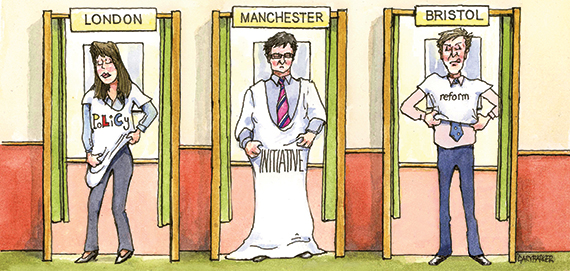One of the main challenges faced by national government is how to develop policies that will have a positive effect across the whole country, not just in parts.
The postponed revaluation of business rates is a good example of the uneven impact a policy can have. Businesses that have performed well since the last revaluation, particularly, for example, those in central London, are paying much lower rates than they might, compared to many struggling businesses stuck paying sky-high bills that do not reflect the change in economic conditions.
Help to Buy is a similar story. It may have helped 80,000 people purchase a property, but with 94% of transactions taking place outside the capital, first-time buyers in London have been left out.
As the economic recovery continues at an uneven rate across the country, it is clear that one size does not always fit all when it comes to policy and the property industry.
In light of this, it is pleasing to see that devolution is high on the agenda of all parties as the general election draws near. The notion of giving local leaders increased powers over their areas has been on the table for a while, so it is good to see it finally being taken seriously – even if it did take almost losing Scotland to make politicians sit up and listen.
It is against this background that next week the British Property Federation’s development committee will be travelling to Bristol, Birmingham, Leeds, Newcastle, Manchester and Liverpool to discuss exactly what it is that each area needs to bring about the regeneration and development that it desires.
The BPF first undertook a tour of key regional centres last December. The results were fascinating and varied, with devolution one of the hottest topics. While all regions agreed that some degree of devolution to a regional level would be positive for our industry, there were differing opinions as to how this might best be realised.
There was consensus that the devolution of decision-making powers would be beneficial to the property industry, with many areas desiring more flexibility to decide which government initiatives and structures to use, and more freedom to make use of innovative measures such as tax increment finance. But it was also noted that while Manchester is often (and rightly) held up as a shining example of local authority collaboration, its political stability is unusual, and not necessarily repeatable across the country.
Essentially, we came back to this idea that “one size does not fit all”. Our industry operates across a country that is still recovering from the worst downturn since the great depression. This has affected different areas of the country in different ways, and each will have different pathways to recovery. If the next government wants the real estate industry to prosper, and to continue to deliver the social and economic infrastructure that will keep the UK competitive on a global stage, it needs to ensure that its policy making matches this diversity.
The devolutionary agenda is exciting. But it is also very new territory, and it is ground that we will need to tread carefully and thoughtfully.
Melanie Leech is chief executive of the British Property Federation












